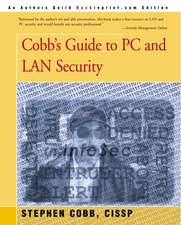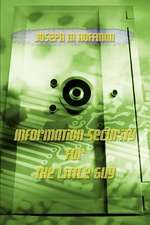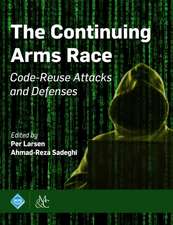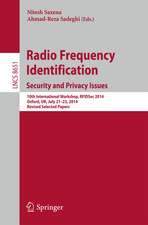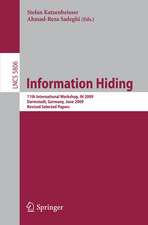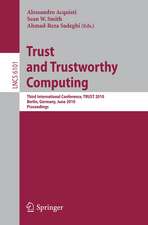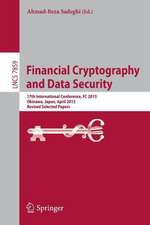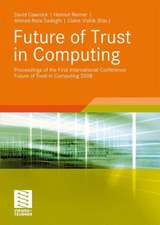Physically Unclonable Functions (PUFs): Applications, Models, and Future Directions: Synthesis Lectures on Information Security, Privacy, and Trust
Autor Christian Wachsmann, Ahmad-Reza Sadeghien Limba Engleză Paperback – 2 ian 2015
| Toate formatele și edițiile | Preț | Express |
|---|---|---|
| Paperback (2) | 176.97 lei 6-8 săpt. | |
| Springer International Publishing – 2 ian 2015 | 176.97 lei 6-8 săpt. | |
| Morgan & Claypool – 30 noi 2014 | 337.30 lei 6-8 săpt. |
Din seria Synthesis Lectures on Information Security, Privacy, and Trust
- 20%
 Preț: 333.72 lei
Preț: 333.72 lei - 20%
 Preț: 325.44 lei
Preț: 325.44 lei - 20%
 Preț: 406.11 lei
Preț: 406.11 lei - 20%
 Preț: 224.00 lei
Preț: 224.00 lei - 20%
 Preț: 275.46 lei
Preț: 275.46 lei - 20%
 Preț: 176.97 lei
Preț: 176.97 lei - 20%
 Preț: 269.20 lei
Preț: 269.20 lei - 20%
 Preț: 176.82 lei
Preț: 176.82 lei - 20%
 Preț: 226.64 lei
Preț: 226.64 lei - 20%
 Preț: 199.72 lei
Preț: 199.72 lei - 20%
 Preț: 237.93 lei
Preț: 237.93 lei - 20%
 Preț: 199.72 lei
Preț: 199.72 lei - 20%
 Preț: 224.97 lei
Preț: 224.97 lei - 20%
 Preț: 223.67 lei
Preț: 223.67 lei - 20%
 Preț: 199.72 lei
Preț: 199.72 lei - 20%
 Preț: 199.72 lei
Preț: 199.72 lei - 20%
 Preț: 227.12 lei
Preț: 227.12 lei - 20%
 Preț: 223.67 lei
Preț: 223.67 lei - 20%
 Preț: 199.72 lei
Preț: 199.72 lei - 20%
 Preț: 357.06 lei
Preț: 357.06 lei - 20%
 Preț: 225.67 lei
Preț: 225.67 lei - 20%
 Preț: 224.50 lei
Preț: 224.50 lei - 20%
 Preț: 412.74 lei
Preț: 412.74 lei - 20%
 Preț: 164.13 lei
Preț: 164.13 lei - 20%
 Preț: 225.48 lei
Preț: 225.48 lei - 20%
 Preț: 248.03 lei
Preț: 248.03 lei
Preț: 176.97 lei
Preț vechi: 221.20 lei
-20% Nou
Puncte Express: 265
Preț estimativ în valută:
33.87€ • 36.77$ • 28.45£
33.87€ • 36.77$ • 28.45£
Carte tipărită la comandă
Livrare economică 22 aprilie-06 mai
Preluare comenzi: 021 569.72.76
Specificații
ISBN-13: 9783031012167
ISBN-10: 303101216X
Ilustrații: IX, 81 p.
Dimensiuni: 191 x 235 mm
Greutate: 0.17 kg
Editura: Springer International Publishing
Colecția Springer
Seria Synthesis Lectures on Information Security, Privacy, and Trust
Locul publicării:Cham, Switzerland
ISBN-10: 303101216X
Ilustrații: IX, 81 p.
Dimensiuni: 191 x 235 mm
Greutate: 0.17 kg
Editura: Springer International Publishing
Colecția Springer
Seria Synthesis Lectures on Information Security, Privacy, and Trust
Locul publicării:Cham, Switzerland
Cuprins
Preface.- Introduction.- Basics of Physically Unclonable Functions.- Attacks on PUFs and PUF-based Systems.- Advanced PUF Concepts.- PUF Implementations and Evaluation.- PUF-based Cryptographic Protocols.- Security Model for PUF-based Systems.- Conclusion.- Terms and Abbreviations.- Bibliography.- Authors' Biographies .
Notă biografică
Christian Wachsmann is a postdoctoral researcher at the Intel Collaborative Research Institute for Secure Computing (ICRI-SC) at TU Darmstadt. He received his Ph.D. in computer science from Technische Universität Darmstadt, Germany. His current research focuses on the design, development, formalmodeling, and security analysis of security architectures and cryptographic protocols to verify the software integrity (attestation) of embedded systems. Christian is the main author of more than 30 scientific publications in internationally renowned journals and conferences on information and communications security.Ahmad-Reza Sadeghi is a full professor of computer science at Technische Universitat Darmstadt, Germany. He is the head of the System Security Lab at the Center for Advanced Security Research Darmstadt (CASED) and Director of the Intel Collaborative Research Institute for Secure Computing (ICRI-SC) at TU Darmstadt. He holds a Ph.D. in computer science from the University of Saarland in Saarbrucken, Germany. Prior to academia, he worked in research and development of telecommunications enterprises, such as Ericsson Telecommunications. He has served on the Editorial Board of the ACM Transactions on Information and System Security.





